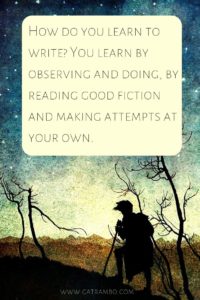 How do you learn to write? You learn by observing and doing, by reading good fiction and making attempts at your own. The truth is that writing is primarily self-taught, that the axiom that you must write a million words is on the mark, and that the first rule is this: To learn to write, you must be writing.
How do you learn to write? You learn by observing and doing, by reading good fiction and making attempts at your own. The truth is that writing is primarily self-taught, that the axiom that you must write a million words is on the mark, and that the first rule is this: To learn to write, you must be writing.
With my students who are writing and thinking about writing, I would have to actively give them bad advice like Play videogames rather than write. Don’t read anything. Only write when you’re in the mood. for them not to get better. That’s the plain and simple truth.
So Do Writing Classes Help?
Writing classes do help – or can, at any rate, depending on what you do with them. They can supply short-cuts, impetus, tricks and techniques. They can kick you in the butt and make you produce, by forcing you to give fellow students a piece to critique, or via homework or in-class timed writings. They can provide inspiration to keep going by giving you something new to try or a way to break a log-jam or dry spell. They can build connections and new friends for you, sometimes friendships that will last for years or even decades.
But with or without them, if you’re writing and think about writing, you will get better at word-smithing, and that is true no matter what stage of the game you’re at. I schedule classes with other people for the Rambo Academy because they’re classes I want to take, which means I’ve been very lucky in recent years, getting to hear people like Seanan McGuire talk about writing series or Ann Leckie discuss writing space opera. Those classes always inspire me, and the novel that I have coming out next year from Tor had its genesis in Leckie’s class. If I wasn’t willing to take classes, I wouldn’t have had that inspiration.
What Should You Learn to Become a Writer?
What should you learn? Learn grammar, so you don’t have to rely on Word’s red wiggly line to tell you when you’ve got a subject/verb agreement. But remember a good, innovative writer colors outside the lines sometimes — know the rules so you can break them with panache. A writer writing to get a high score on Grammarly is missing the chance to innovate and improvise, and aiming for mediocrity in the process.
Learn how to show instead of tell, weaving a dream to pull in your readers. Pay attention to your senses so you can replicate those sensations in your text. Work on supplying the details without ever drawing attention to yourself, so you never commit the cardinal sin and remind the reader that they are reading. Look at how other people do it, and find the techniques that work for you.
Learn how to revise what you write, so you can just write whatever you’re writing, knowing that you’ll make it perfect in the rewrite, and relax into that joyful flow of verbiage. That’s another thing you must be doing in order to learn the skill, but also a place where working with a group that lets you critique other people’s work as well as be critiqued will help you learn it faster.
Critiquing groups are a vast help but not in the way you think. You learn more from critiquing someone else’s work than you do from having your own critiqued, because the former forces you to articulate your ideas and understandings of fiction. You’ll be amazed at how often the problem you’re spotting in someone else’s work will turn up in your own.
What Should You Read to Become a Writer?
What should you read? Read everything — contemporary and classic — and when you love or hate a piece of writing, go back and figure out why. Look at what other authors are doing and imitate them. Steal like Picasso and make things your own.
Read stuff that wins awards so you know what the current trends are and who’s producing what. You can’t predict where the market will be going, but you can know what territory has been so well-visited that it probably won’t be returned to.
Read nonfiction because so much of the stuff of story resides there. Nonfiction will give you details that help makes your dream real for the reader, as well as insight and information that will help shape your stories.
Read poetry because it is beautiful and feeds your soul, and because it will teach you new things to do with words, while seeping into your writing and tinging it with new and beautiful colors.
What Should You Do to Become a Writer?
You must write. Every day if you have that luxury, even if it’s a quick 100 words squeezed in on your phone on the bus to work. You must figure out how to carve space and time for your writing, and you must defend that time from well-meaning friends and vile enemies alike. You must learn to step the hell away from social media and other distractions sometimes and just write. Use the things you love to coax yourself along — ten minutes on Twitter if you finish that page, an ice cream cone for hitting your weekly word count, that new fountain pen for completing that story. Find the things that make you productive — and do them.
You must — at some point — start sending stuff out. Don’t do the editor’s job for them by rejecting the work before they even see it. Send it out and write more while you’re waiting for it to come back.
Remember that writing is a professional activity, that if you’re putting yourself out into the public maybe you want to think about how you’re coming off in face to face and online interactions. It’s a small eco-system and you’ll find that the editorial intern you take out a frustration on today may well be the acquiring editor turning down your book somewhere down the line. Don’t assume you always have the right answer, and don’t be afraid to admit when you don’t. Be kind. Or at least, as per Connie Willis’ advice, don’t be a jackass.
The unexamined life is not worth living, Plato tells us, and I will add that it’s not one that makes you a better writer. If you want to understand the human heart, look to your own and all its petty mean behaviors as well as the nobility of which it is capable. Write what you know; write truth. All of this will help you become a writer.
But write. And write, and write some more. You cannot be a writer until you begin to write.*
*For an alternate viewpoint, consult Timothy the Cat.





